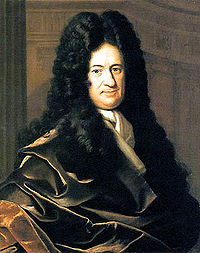- Infinitesimal calculus
-
Infinitesimal calculus is the part of mathematics concerned with finding slope of curves, areas under curves, minima and maxima, and other geometric and analytic problems. It was independently developed by Gottfried Leibniz and Isaac Newton starting in the 1660s. John Wallis exploited an infinitesimal he denoted
 in area calculations, preparing the ground for integral calculus. They drew on the work of such mathematicians as Barrow and Descartes. It[clarification needed] consisted of differential calculus and integral calculus, respectively used for the techniques of differentiation and integration.
in area calculations, preparing the ground for integral calculus. They drew on the work of such mathematicians as Barrow and Descartes. It[clarification needed] consisted of differential calculus and integral calculus, respectively used for the techniques of differentiation and integration.Newton sought to remove the use of infinitesimals from his fluxional calculus, preferring to talk of velocities as in "For by the ultimate velocity is meant ... the ultimate ratio of evanescent quantities". Leibniz embraced the concept fully calling differentials "...an evanescent quantity which yet retains the character of that which is disappearing", and his notation for them is the current symbolism in calculus, though Newton's occasionally appears in physics and other fields[citation needed].
In early calculus the use of infinitesimal quantities was unrigorous, and was fiercely criticized by a number of authors, most notably Michel Rolle and Bishop Berkeley. Berkeley famously described infinitesimals in his book The Analyst in 1734.
Several mathematicians, including Maclaurin and d'Alembert, attempted to prove the soundness of using limits, but it would be 150 years later, due to the work of Cauchy and Weierstrass, where a means was finally found to avoid mere "notions" of infinitely small quantities, that the foundations of differential and integral calculus were made firm. In Cauchy's writing, we find a versatile spectrum of foundational approaches, including a definition of continuity in terms of infinitesimals, and a (somewhat imprecise) prototype of an (ε, δ)-definition of limit in the definition of differentiation. In his work Weierstrass formalized the concept of limit and eliminated infinitesimals. Following the work of Weierstrass, it eventually became common to base calculus on limits instead of infinitesimal quantities.
This approach formalized by Weierstrass came to be known as the standard calculus. Informally, the name "infinitesimal calculus" became commonly used to refer to Weierstrass' approach.
Modern infinitesimals
Main article: Hyperreal numberAfter many years of the infinitesimal approach to calculus having fallen into disuse other than as an introductory pedagogical tool, use of infinitesimal quantities was finally given a rigorous foundation by Abraham Robinson in the 1960s. Robinson's approach, called non-standard analysis, uses technical machinery from mathematical logic to create a theory of hyperreal numbers that interpret infinitesimals in a manner that allows a Leibniz-like development of the usual rules of calculus.
Varieties of infinitesimal calculus
- Differential and integral calculus: together, the original infinitesimal calculus, due to Newton and Leibniz.
- Standard calculus (based on the approach of Weierstrass)
- Non-standard calculus (based on Robinson's approach to infinitesimals)
Bibliography
- Baron, Margaret E.: The origins of the infinitesimal calculus. Dover Publications, Inc., New York, 1987.
- Baron, Margaret E.: The origins of the infinitesimal calculus. Pergamon Press, Oxford-Edinburgh-New York 1969. (A new edition of Baron's book appeared in 2004)
Infinitesimals History Adequality · Infinitesimal calculus · Leibniz's notation · Integral sign · Criticism of non-standard analysis · The Analyst · The Method of Mechanical Theorems · Cavalieri's principleRelated branches of mathematics Formalizations of infinitesimal quantities Individual concepts Standard part function · Transfer principle · Hyperinteger · Increment theorem · Monad · Internal set · Levi-Civita field · Hyperfinite set · Law of Continuity · OverspillScientists Infinitesimals in physics and engineering Textbooks Analyse des Infiniment Petits · Elementary Calculus
Wikimedia Foundation. 2010.


